Four PhD students from Rice University travel to the Netherlands
Four PhD students from Rice University were awarded research fellowships to travel to the Netherlands this past May to conduct field-based research on coastal flood risk reduction. Over the two-week program, students interacted with Dutch students and researchers through workshops, field trips, and personal meetings. The trip concluded with student presentations where they related case study-based research in the Netherlands to their own thesis work.
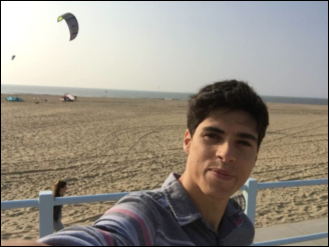
Ben Bass - Department of Civil and Environmental Engineering
For the NSF PIRE International Research Fellowship, Ben is attempting to develop a storm index that will indicate the potential storm surge, wave, and rainfall impacts expected from the extratropical storms that impact the Netherlands. This compliments his PhD work, since his research has focused on characterizing and forecasting storm surge impacts expected from hurricanes. “The NSF PIRE program has been a great experience, and I have learned a wealth of information regarding the hazards faced in the Netherlands and how progressive and preventative risk-assessments and flood defense practices are implemented to protect their country,” said Ben Bass.
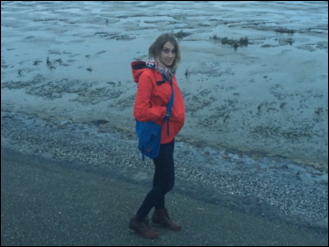
Katherine Anarde - Department of Civil and Environmental Engineering
Katherine’s research integrates field experiments with computational models to investigate morphological changes to coastal barriers and tidal deltas along the Texas Gulf Coast. While in the Netherlands, she learned how Dutch engineering practices have influenced coastal dynamics and is relating these observations to her PhD case study region. “I am particularly interested in how storm surge gates and barriers will impact sediment transport, wave, and tidal dynamics if constructed within the Houston-Galveston region,” said Katherine Anarde. “I returned to the States with new ideas and methodologies as well as an addiction to stroopwafels!”

Sabarethinam Kameshwar - Department of Civil and Environmental Engineering
Sabarethinam’s PhD research focuses on assessing flood risk to critical infrastructure in the Houston-Galveston Region and during this fellowship, she assessed flood risk to storage tanks in the Port of Rotterdam. “This trip was a great learning experience and I learned a lot from local experts,” said Sabarethinam Kameshwar. “I also had a fun time visiting different cities and trying out local food; the stroopwafels are awesome!”
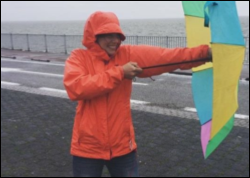
Brandee Carlson - Department of Earth Science
For Brandee’s PhD research, she is studying deltaic systems, for which she conduct fieldwork and use numerical models to investigate modern sediment transport for the Yellow River delta, China. She visited the Netherlands to learn about the morphological response of coastlines to engineering practices. “My time in the Netherlands inspired me to consider new modeling approaches for my research and it also raised the bar on what I consider to be delicious cheese,” said Brandee Carlson.
SSPEED Visits the Netherlands (Spring Semester 2016)
This spring, SSPEED Center researchers visited the Netherlands and TU-Delft with the objective to advance and lay the groundwork for the student NSF (National Science Foundation) PIRE (Partnerships for International Research & Education) trip in May 2016.
During the week, SSPEED researchers visited the three case study areas: Ijsselmeer, Rotterdam/Europoort2 and Oosterschelde/Vlissingen. At each case study location, researchers received presentations from local experts, including professors, students and government employees. Additionally, SSPEED representatives worked to identify future place-based research topics for students and faculty from the United States.
The SSPEED Center researchers also participated in a joint meeting hosted by TU-Delft at the Delft Science Center. This was a full-day meeting, consisting of more than 25 presentations and updates on ongoing collaborative research between Delft and Texas universities, as well as presentations specific to the three case study areas. The overall objective was to help identify future projects.
The SSPEED Center will continue building on this international partnership in the upcoming months.

Caption: The three maps where NFS PIRE scouting trips took place in the Netherlands.
Martijn Schlepers: U.S. Experience (Fall Semester 2015)
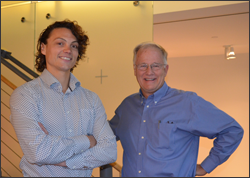
Martijn Schlepers earned master’s degree in hydraulic engineering at TU-Delft-The Netherlands with his thesis on the Houston Ship Channel Barrier. Due to his interest and expertise in protecting the Houston-Galveston area from storms and flooding, he was given the opportunity from SSPEED Center researchers to continue his research and work in Houston, with funding from the SSPEED Center.
In the fall semester of 2015, Martijn has worked under Charlie Penland at Walter P. Moore on the design of a movable storm surge barrier for the Houston Ship Channel. He has evaluated various design models with the use of advanced structural modeling software. Interactions with TU-Delft will continue through the NSF PIRE grant with TAMU- Galveston/SSPEED Center.
“My hope is within the next 10 years, the Houston-Galveston area will have taken measurable steps to design and build a solid protection system to prevent flooding, instead of reacting to it,” said Schlepers. During his time in the U.S., Martijn’s favorite activities have been observing and enjoying the local culture through his trips to Austin, San Antonio and New Orleans. He has embraced the fast-paced business atmosphere of working in downtown Houston and meeting with various coworkers to discuss the best structural solutions.
The Dutch Visit Texas:: Building a Stronger Transatlantic Partnership (September 2015)
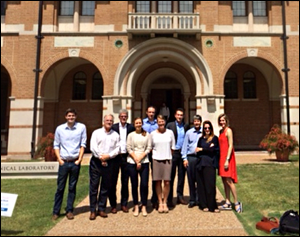 Expanding on a successful collaborative research exchange in the Netherlands this April, the SSPEED Center and Texas A&M Galveston (TAMUG) recently extended a warm "Texas Welcome" to prominent Dutch researchers. The primary purpose for the Dutch visit was to collectively disseminate insights and progress from storm surge mitigation studies for the Houston-Galveston region through a series of meetings and open forum discussions. These meetings coincided with the 7th anniversary of Hurricane Ike's landfall. Texan and Dutch researchers also marked the successful release of three critical milestones, the (1) SSPEED Center's 2015 Annual Report describing their latest efforts towards the Houston-Galveston Area Protection System (H-GAPS), (2) the PIRE Award, and (3) TU Delft's book entitled: Delft Delta Design: Houston Galveston Bay Region, Texas, USA, which highlights collaborative research completed at TU Delft to-date. Expanding on a successful collaborative research exchange in the Netherlands this April, the SSPEED Center and Texas A&M Galveston (TAMUG) recently extended a warm "Texas Welcome" to prominent Dutch researchers. The primary purpose for the Dutch visit was to collectively disseminate insights and progress from storm surge mitigation studies for the Houston-Galveston region through a series of meetings and open forum discussions. These meetings coincided with the 7th anniversary of Hurricane Ike's landfall. Texan and Dutch researchers also marked the successful release of three critical milestones, the (1) SSPEED Center's 2015 Annual Report describing their latest efforts towards the Houston-Galveston Area Protection System (H-GAPS), (2) the PIRE Award, and (3) TU Delft's book entitled: Delft Delta Design: Houston Galveston Bay Region, Texas, USA, which highlights collaborative research completed at TU Delft to-date.
Weekly events commenced with a two-day workshop hosted by TAMUG. The primary purpose of the workshop was to provide opportunities for multidisciplinary participants and stakeholders to delve into past and present efforts towards developing an actionable plan for regional storm surge risk reduction. The TAMUG workshop served as a platform for technical modeling experts to participate in constructive open forum discussions on the various modeling efforts approaches. Representatives from the public, private, and academic sectors gave presentations related to storm surge modeling, flood risk modeling, and regional economic damage modeling. Notable participants included the U.S. Army Corps of Engineers - Galveston District, General Land Office, and Texas Senator Larry Taylor. Other key participants were from ARCADIS, Dannenbaum Engineering, Walter P. 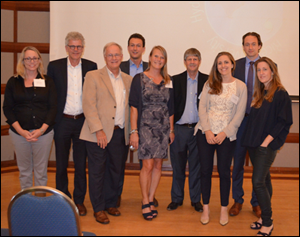 Moore, TU Delft, Jackson State University, TAMUG, the University of Texas at Austin, University of Houston, and Rice University. In addition, the SSPEED Center invited the Dutch researchers to Rice University to discuss further details and shared insights on the proposed H-GAPS barrier concepts and specific hydraulic design parameters, as well as identifying means for integrating future research opportunities and bolstering long-term collaboration with the Dutch. Moore, TU Delft, Jackson State University, TAMUG, the University of Texas at Austin, University of Houston, and Rice University. In addition, the SSPEED Center invited the Dutch researchers to Rice University to discuss further details and shared insights on the proposed H-GAPS barrier concepts and specific hydraulic design parameters, as well as identifying means for integrating future research opportunities and bolstering long-term collaboration with the Dutch.
The meetings culminated with a book launch and reception on Rice campus. The event began with a remembrance and acknowledgement of the contributions made by Professor Thomas Colbert, who originally proposed the collaboration between SSPEED and researchers at TU Delft. This was followed by a presentation by Professor Bas Jonkman from TU Delft, who highlighted its contribution to the study of coastal flood risk management for the Houston-Galveston region. TU Delft formally presented some of the first copies of the book to Council Member David Robinson, Mayor Michel Bechtel from Morgan's Point and Mayor Glenn Royal from Seabrook. A pdf copy of the book can be found on the TU Delft repository, here:
http://repository.tudelft.nl/view/ir/uuid%3Af0050998-1350-4992-9f63-b3c732dd5714/
The SSPEED Dutch Experience (April 2015 Visit)
Researchers from the SSPEED Center were invited by TU Delft to participate in a collaborative exchange of ideas on next generation storm surge barriers. This consisted of meetings, open forum discussions, and formal presentations from researchers, including SSPEED Center Director Philip Bedient, Charlie Penland of Water P. Moore, TU-Delft's Bas Jonkman and Rice Alumna and current Fulbright Fellowship Recipient Antonia Sebastian. The visit commenced with a planning workshop for an international colloquium focused on riverine and coastal flood risk management. Attendees included representatives from Texas, the Netherlands, and the United Kingdom. Participants emphasized the need for comparing and contrasting the various institutional approaches experienced in the United States, United Kingdom, and the Netherlands towards sustainable flood risk management. A critical need for developing better ways for translating the science behind flood risk and flood forecasting to the general public was one of many proposed topics for the colloquium.
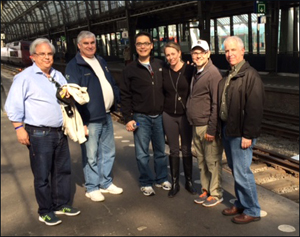
In addition, a "mini"-workshop took place on the campus of TU Delft, in which Delft and SSPEED researchers presented and discussed on-going work on the Texas Case/H-GAPS initiative. Particular topics of discussion included storm surge modeling, optimization and gate/barrier design, and flood risk and damage assessments. From these presentations, ideas and opportunities for long-term collaboration between TU Delft and the SSPEED Center were identified. Dr. Bedient and Mr. Penland were also invited to present at "Next Generation Storm Surge Barriers," a formal colloquium sponsored by the Delta Infrastructure & Mobility Initiative (DIMI) in collaboration with TU Delft and the Royal Dutch Society of Engineers (KIVI). They presented new results from H-GAPS regional storm surge protection strategy, and the audience consisted of students, researchers, and engineers with interest in flood risk reduction and planning in urbanized deltas. The talk was well received by the audience.
The visit also opened opportunities for surge barrier site visits. Researchers from the SSPEED Center took advantage of the visit by exploring well-known Dutch surge barriers in greater detail (i.e. the Maeslant and Oosterschelde) whose designs have inspired several of the preliminary concepts for barrier design and research modeling adopted in the H-GAPS Study.
|






 Expanding on a successful collaborative research exchange in the Netherlands this April, the SSPEED Center and Texas A&M Galveston (TAMUG) recently extended a warm "Texas Welcome" to prominent Dutch researchers. The primary purpose for the Dutch visit was to collectively disseminate insights and progress from storm surge mitigation studies for the Houston-Galveston region through a series of meetings and open forum discussions. These meetings coincided with the 7th anniversary of Hurricane Ike's landfall. Texan and Dutch researchers also marked the successful release of three critical milestones, the (1) SSPEED Center's 2015 Annual Report describing their latest efforts towards the Houston-Galveston Area Protection System (H-GAPS), (2) the PIRE Award, and (3) TU Delft's book entitled: Delft Delta Design: Houston Galveston Bay Region, Texas, USA, which highlights collaborative research completed at TU Delft to-date.
Expanding on a successful collaborative research exchange in the Netherlands this April, the SSPEED Center and Texas A&M Galveston (TAMUG) recently extended a warm "Texas Welcome" to prominent Dutch researchers. The primary purpose for the Dutch visit was to collectively disseminate insights and progress from storm surge mitigation studies for the Houston-Galveston region through a series of meetings and open forum discussions. These meetings coincided with the 7th anniversary of Hurricane Ike's landfall. Texan and Dutch researchers also marked the successful release of three critical milestones, the (1) SSPEED Center's 2015 Annual Report describing their latest efforts towards the Houston-Galveston Area Protection System (H-GAPS), (2) the PIRE Award, and (3) TU Delft's book entitled: Delft Delta Design: Houston Galveston Bay Region, Texas, USA, which highlights collaborative research completed at TU Delft to-date. Moore, TU Delft, Jackson State University, TAMUG, the University of Texas at Austin, University of Houston, and Rice University. In addition, the SSPEED Center invited the Dutch researchers to Rice University to discuss further details and shared insights on the proposed H-GAPS barrier concepts and specific hydraulic design parameters, as well as identifying means for integrating future research opportunities and bolstering long-term collaboration with the Dutch.
Moore, TU Delft, Jackson State University, TAMUG, the University of Texas at Austin, University of Houston, and Rice University. In addition, the SSPEED Center invited the Dutch researchers to Rice University to discuss further details and shared insights on the proposed H-GAPS barrier concepts and specific hydraulic design parameters, as well as identifying means for integrating future research opportunities and bolstering long-term collaboration with the Dutch. 